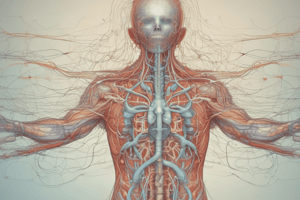Podcast
Questions and Answers
Which division of the peripheral nervous system is responsible for involuntary control of bodily functions?
Which division of the peripheral nervous system is responsible for involuntary control of bodily functions?
- Afferent Division
- Autonomic System (correct)
- Efferent Division
- Somatic System (correct)
Which of the following is NOT a causative factor for Peptic Ulcer Disease?
Which of the following is NOT a causative factor for Peptic Ulcer Disease?
- Inadequate mucosal defense
- Increased gastric acid secretion
- Infection with H. Pylori
- Ingestion of omega-3 fatty acids (correct)
Which class of drugs is primarily used to reduce gastric acid secretion?
Which class of drugs is primarily used to reduce gastric acid secretion?
- H2-Histamine receptor blockers (correct)
- Antimuscarinic agents
- Anti-acid Agents
- Prostaglandins
Which of the following drugs is an example of a Mucosal protective agent?
Which of the following drugs is an example of a Mucosal protective agent?
What is the primary purpose of a prostaglandin in the context of Peptic Ulcer treatment?
What is the primary purpose of a prostaglandin in the context of Peptic Ulcer treatment?
What is the primary focus of pharmacology?
What is the primary focus of pharmacology?
Which division of the nervous system includes the brain and spinal cord?
Which division of the nervous system includes the brain and spinal cord?
What is the role of afferent neurons?
What is the role of afferent neurons?
Which system is responsible for involuntary control over smooth muscle and glands?
Which system is responsible for involuntary control over smooth muscle and glands?
What does the sympathetic nervous system NOT primarily increase?
What does the sympathetic nervous system NOT primarily increase?
What is an effect of the sympathetic nervous system during the 'fight or flight' response?
What is an effect of the sympathetic nervous system during the 'fight or flight' response?
Which neurons innervate the gastrointestinal tract independently of the CNS?
Which neurons innervate the gastrointestinal tract independently of the CNS?
What is one of the functions of the efferent autonomic system?
What is one of the functions of the efferent autonomic system?
Flashcards
Pharmacology
Pharmacology
The study of how drugs interact with the body and how the body responds to drugs.
Efferent neurons
Efferent neurons
Carry signals from the brain/spinal cord to the body's tissues.
Sympathetic Nervous System
Sympathetic Nervous System
Part of the nervous system that controls "fight or flight" responses, increasing heart rate, blood pressure, etc.
Central Nervous System (CNS)
Central Nervous System (CNS)
Signup and view all the flashcards
Peripheral Nervous System
Peripheral Nervous System
Signup and view all the flashcards
Drugs
Drugs
Signup and view all the flashcards
Enteric neurons
Enteric neurons
Signup and view all the flashcards
Autonomic Nervous System
Autonomic Nervous System
Signup and view all the flashcards
H. pylori
H. pylori
Signup and view all the flashcards
NSAID-induced ulcers
NSAID-induced ulcers
Signup and view all the flashcards
What are PPI drugs used for?
What are PPI drugs used for?
Signup and view all the flashcards
Anti-acid agents
Anti-acid agents
Signup and view all the flashcards
Mucosal protective agents
Mucosal protective agents
Signup and view all the flashcards
Study Notes
Pharmacology Introduction
- Pharmacology is the study of how drugs interact with the body and how the body responds to drugs.
- Drugs are chemical compounds affecting living processes. They are used for treatment, prevention, and diagnosis of diseases.
- Factors affecting drug action include absorption rate, distribution rate, metabolism rate, and elimination rate.
Nervous System Introduction
- The nervous system is divided into two main parts: the central nervous system (CNS) and the peripheral nervous system.
- The CNS comprises the brain and spinal cord.
- The peripheral nervous system includes neurons located outside the brain and spinal cord.
Nervous System Divisions
- The efferent neurons carry signals from the brain and spinal cord to peripheral tissues.
- The afferent neurons bring information from the periphery to the CNS.
- The somatic nervous system controls voluntary actions like skeletal muscle contraction.
- The autonomic nervous system controls involuntary actions like smooth muscle, cardiac muscle, and glandular secretion.
- The autonomic system is divided into the sympathetic and parasympathetic nervous systems.
Effects of the Sympathetic Nervous System
- Increase heart rate and blood pressure.
- Mobilize energy stores in the body.
- Increase blood flow to skeletal muscles and the heart.
Peptic Ulcer Disease and Treatment
- Causative factors for peptic ulcers include nonsteroidal anti-inflammatory drugs (NSAIDs) and Helicobacter pylori infection.
- Ulcers are caused by inadequate mucosal defense mechanisms against excess gastric acid.
- Treatment includes eradicating H. pylori, reducing gastric acid secretion, and protecting the gastric mucosa from damage.
- Drugs used to treat peptic ulcers include H2-receptor blockers and proton pump inhibitors.
- Antimicrobial agents may be necessary for infection eradication.
- Mucosal protective agents like bismuth subsalicylate and prostaglandins may also be helpful.
Drugs for Peptic Ulcer
- Inhibitors of proton pump inhibitors (PPIs) like esomeprazole, lansoprazole, omeprazole, pantoprazole, and rabeprazole.
- Antacids like aluminum hydroxide, calcium carbonate, magnesium hydroxide, and sodium bicarbonate.
- Anticholinergic agents like dicyclomine.
- Mucosal protective agents like bismuth subsalicylate and misoprostol.
Studying That Suits You
Use AI to generate personalized quizzes and flashcards to suit your learning preferences.
Related Documents
Description
This quiz covers the fundamental concepts of pharmacology and the nervous system. Learn about how drugs interact with the body, the structure of the nervous system, and the functions of its divisions. Dive into essential information that connects these two critical areas of study.



